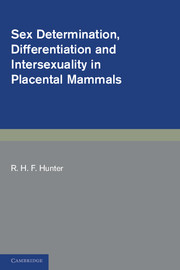Book contents
- Frontmatter
- Contents
- Preface
- Acknowledgements
- List of abbreviations
- List of gene abbreviations
- 1 Historical landmarks in studies of reproduction and sex determination
- 2 Mechanisms of sex determination
- 3 Differentiation of the gonads
- 4 Differentiation of the genital duct system
- 5 Anomalous sexual development in domestic species
- 6 Abnormal sexual development in laboratory rodents
- 7 Abnormal sexual development in man
- 8 Sexual differentiation in chimaeras
- 9 Asymmetries in the reproductive system and their significance
- 10 Concluding thoughts and a current perspective
- Index
- Plate section
2 - Mechanisms of sex determination
Published online by Cambridge University Press: 05 March 2012
- Frontmatter
- Contents
- Preface
- Acknowledgements
- List of abbreviations
- List of gene abbreviations
- 1 Historical landmarks in studies of reproduction and sex determination
- 2 Mechanisms of sex determination
- 3 Differentiation of the gonads
- 4 Differentiation of the genital duct system
- 5 Anomalous sexual development in domestic species
- 6 Abnormal sexual development in laboratory rodents
- 7 Abnormal sexual development in man
- 8 Sexual differentiation in chimaeras
- 9 Asymmetries in the reproductive system and their significance
- 10 Concluding thoughts and a current perspective
- Index
- Plate section
Summary
Introduction
Diverse mechanisms are involved in the determination of sex in lower animals, such as the ratio of the number of X chromosomes to autosomes in Drosophila (Hodgkin, 1990) or the ambient temperature during incubation of the embryo in turtles, alligators, crocodiles and some lizards (Charnier, 1966; Bull, 1980, 1983, 1987; Head, May & Pendleton, 1987; Deeming & Ferguson, 1988; Ewert & Nelson, 1991). However, the dogma for eutherians remains that it is the genetic nature of the spermatozoon penetrating and activating the oocyte that is the primary determinant of the sex in the resultant zygote. Such a genetic mechanism is taken to indicate evolutionary progress from the lower vertebrates in which environmental influences exercise such a large and often decisive rôle in directing the path of sexual differentiation. The genetic mechanism for sex determination in mammals is viewed as relatively stable, inferring that mammals have thereby gained an increased control over their environment (Mintz, 1968).
Because females are the homogametic sex in mammals, bearing two X chromosomes in diploid cells, it falls to the heterogametic population of spermatozoa to impose the decision and developmental programme according to the type of spermatozoon fusing with the oocyte and delivering its haploid complement of chromosomes into the vitellus. Activation of the egg by a Y-bearing spermatozoon is classically held to give rise to a male embryo, if the events of fertilisation and early development proceed successfully.
- Type
- Chapter
- Information
- Publisher: Cambridge University PressPrint publication year: 1995



